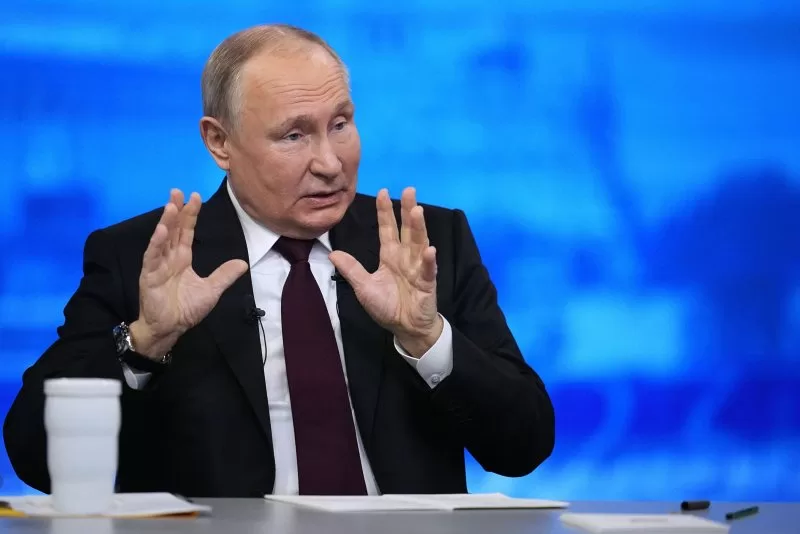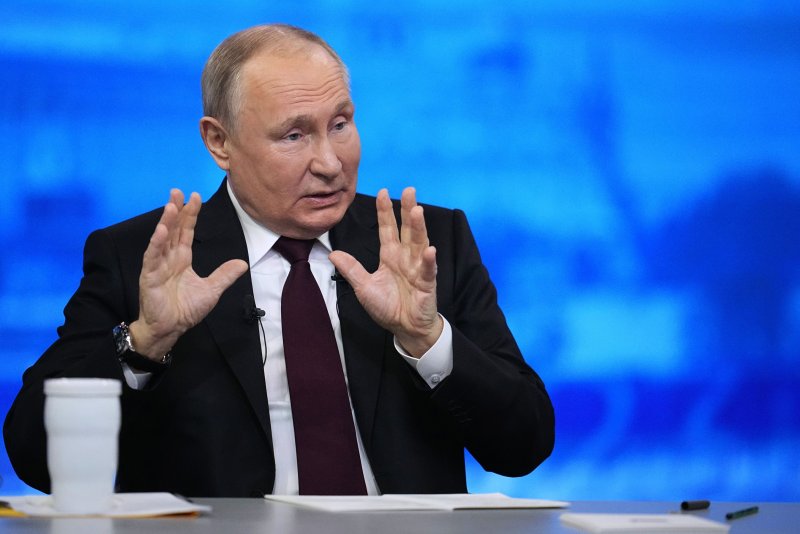1 of 2 | Russian President Vladimir said Wednesday he would re-deploy military forces along the border with Finland in response to the country becoming a member of the NATO alliance in April. File Pool Photo by Alexander Zemlianchenko/EPA-EFE
March 13 (UPI) — Russian President Vladimir Putin said Wednesday he would re-deploy military forces along the border with Finland in response to the country becoming a member of the NATO alliance in April.
Putin made the threat in an interview with state media in response to what he said was Finland and Sweden’s “absolutely senseless step from the point of view of ensuring their own national interests.”
“We generally had ideal relations with Finland. Simply perfect. We did not have a single claim against each other, especially territorial, not to mention other areas. We didn’t even have troops; we removed all the troops from there, from the Russian-Finnish border,” he said.
“However, it is up to them to decide. That’s what they decided. But we didn’t have troops there, now we will.”
Finland and Sweden applied to join NATO together in 2022, shortly after Russia’s invasion of Ukraine. Finland officially joined the military alliance last April, while Sweden was forced to wait until last week amid holdouts by Hungary and Turkey.
Putin’s comments came as Finnish Prime Minister Petteri Orpo told the European Parliament in Strasbourg that the rest of the bloc must follow Finland’s example in ramping up security on its fringes.
He said hybrid threats to Finland, including Russia’s “worrisome” weaponization of migration by funneling people from third countries toward the Finland border, had forced his country to become a preparedness superpower.
“It is a status born out of necessity and reinforced by our history and geographical position. Finland stands ready to share our experiences of resilience and readiness,” Orpo told MEPs.
“We have developed comprehensive strategies that cover all sectors of society, from public to private. Our approach to preparedness includes not only physical defenses but also societal resilience, which is critical in facing both conventional and hybrid threats.”
He said he believed Finland’s model could provide valuable lessons for the European Union and that adopting similar “comprehensive and forward-thinking strategies” would boost the resilience of the entire EU.
Warning that if migrant numbers at the Finland-Russia border grew it would not only threaten national security but pose an existential threat to the bloc, Orpo called for an urgent review of existing EU legislation to ensure it was sufficiently robust to tackle the challenge of hybrid attacks.
“If it is not, then we must consider updating it to better suit the time we are living in. We must send a clear message: Europe is resolute in its defense, agile in its response, and firm in its commitment to the safety of its borders.”
Noting that deteriorating relations with Russia over the Ukraine war had impacted the border economy, effectively ending all tourism and cross-border trade, Orpo stressed that measures addressing the security of borders had to focus on the people living there.
He warned that unless the decline was reversed people would begin leaving those areas, presenting a grave threat to the security and stability of the EU.
Calling for EU-level policies aimed at revitalizing these areas and making them more secure against external threats, he said the security of the EU’s external border regions was “crucial” for national security and societal unity.
Finland’s border with Russia remains closed through April 14, after Helsinki last month extended the total closure of its eastern frontier, which it initially shut in November, for another two months saying it saw no change in Russia’s behavior.
“Finland’s eastern border remains closed due to Russia’s attempts to use instrumentalized migration against Finland. Russia is causing human suffering and using people as tools,” the interior ministry statement said in a statement posted on X.
“Russia is responsible for the situation.”
Finland’s Nov. 16 closure of the border was taken under its Border Guard Act to stop Russia from transporting undocumented migrants and dropping them off at the border.

